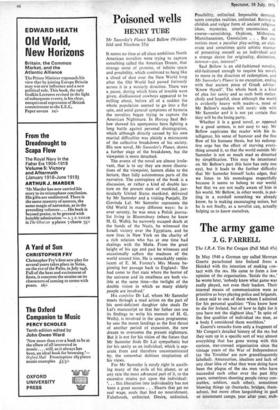Poisoned wells
HENRY TUBE
Mr Sammler's Planet Saul Bellow (Weiden4 feld and Nicolson 35s) It seems no time at all since ambitious North American novelists were trying to capture something called the American Dream, that strange sense of promise, of infinite space and possibility, which continued to hang like a cloud of dust over the New World long after the Old World had passed furiously across it in a westerly direction. There was a pause, during which hints of trouble were given, disillusioned cowboys appeared to be milling about, before all of a sudden the whole population seemed to go into a flat spin, and amid general symptoms of hysteria the novelists began trying to capture the American Nightmare. In Herzog Saul Bel- low showed his eponymous hero fighting a long battle against personal disintegration, which although directly caused by his own marital difficulties was plainly a microcosm of the collective breakdown of his society. His new novel, Mr Sammler's Planet, shows a further stage of the breakdown, but the viewpoint is more detached.
Tice events of the novel are almost irrele- vant, that is to say they are more illustra tions of the viewpoint, lantern slides to the lecture, than fully autonomous parts of the narrative. The centrepiece of the book is a discussion, or rather a kind of double lee+ ture on the present state of mankind, par-, titularly United States mankind, delivered by Mr Sammler and a visiting Punjabi, Dr Govinda Lal. Mr Sammler represents the Old World in many different ways: he is over seventy, he was once a Polish journa- list living in Bloomsbury (where he knew H. G. Wells), he narrowly escaped death at the hands of the Nazis, he witnessed the Israeli victory over the Egyptians, and he now lives in New York on the charity of a rich relation who has at one time had dealings with the Mafia. From the great height of his age and past he witnesses and occasionally suffers the madness of the world around him. He is remarkably remin-1 iscent of E. M. Forster's Mrs Moore bed ginning her passage back to England: She had come to that state where the horror of the universe and its smallness are both visi ible at the same time—the twilight of the double vision in which so many elderly people are involved' His confrere Dr La!, whom Mr Sammler meets through a mad action on the part of his semi-deficient daughter (she steals Dr Lal's manuscript so that her father can use its findings to write his memoir of H. G. Wells), is involved in the space programme; he sees the moon landings as the first thrust of another period of expansion, the new dream to overcome the present nightmare. But it is not for his vision of the future that Mr Sammler finds Dr Lal sympathetic but for his sanity as an individual, which is se/3-, arate from and therefore uncontaminated by, the somewhat dubious utopianism of his views.
For Mr Sammler is surely right in ascriliA ing many of the evils of his planet, or at any rate the most advanced part of it, to the excessive strains put upon the individual: . this liberation into individuality has not been a great success . . . Hearts that get no real wage, souls that find no nourishment. Falsehoods, unlimited. Desire, unlimited, Possibility, unlimited. Impossible demands upon complex realities, unlimited. Revival in childish and vulgar form of ancient religious ideas, mysteries, utterly unconscious of course—astonishing. Orphism, Mithraism, Manichaeanism, Gnosticism . . . But one notices most a peculiar play-acting, an elab- orate and sometimes quite artistic manner of presenting oneself as an individual and a strange desire for originality, distinction, interest—yes, interest!'
Saul Bellow is an old-fashioned novelist, old-fashioned enough to require his novels to move in the direction of redemption, and Mr Sammler's Planet is no exception, ending with that ancient piece of Greek advice: `Know thyself: The whole book is a kind of plea for sanity and as such both melan- choly and hopeful, since although the world is evidently heavy with madness, most of Mr Bellow's readers will surely side with Mr Sammler and it is not yet certain that they will be the losing party.
Whether it is a good novel, as opposed, to a good sermon, is not easy to say. Mr Bellow captivates the reader with his in- telligence, his sense of humour and the fine flow of his humane thesis, but his redemp- tive urge has the effect of starving every- thing around it, so that the world outside Mr Sammler is not so much mad as distorted by simplification. This may be intentional on Mr Bellow's part (his hero has only one eye), but it leads to the further difficulty that Mr Sammler himself lacks edges, that we listen to his monologue respectfully because it seems to belong to our world, but that we are not really aware of him in his world. Mr Bellow, in other words, is put- ting in a nutshell something we already know, he is making encouraging noises, but he is not finally, as a novelist can, actually helping us to know ourselves.






















































 Previous page
Previous page